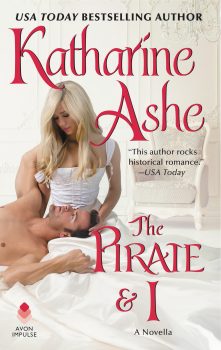The Pirate & I: Author’s Note
There’s something so deliciously wonderful about a character that sneaks up on me slowly, who doesn’t impress or astonish me from the start, but whose courage and strength and true humanity nevertheless shine through and make me realize he’s actually fantastically heroic. That happened for me with Charles Brittle.
In my novella The Scoundrel & I, which I wrote before The Pirate & I, Charlie plays a minor role. When I first met him in that novella, he was a mild-mannered print shopkeeper, meekly working for his father and elder brother, somewhat (inappropriately) infatuated with the shop’s sole female employee, but (fortunately) too weak-willed to act on that infatuation.
It’s true that even as I wrote Charlie in that minor part, I knew he was the real heart of the family business, working punishingly long hours in the smelly, ink-splattered shop producing broadsheets and books. While he did this, his extroverted father and brother were essentially the sales and marketing team, dressing with expensive flare and lingering over liquid lunches with wealthy clients. Charlie‘s willingness to accept that unfair situation without a fight did not rouse my sympathies.
He was not hero material to me.
Then everything changed. While doing historical research, I learned all about the printing trade in early nineteenth-century London. And what I discovered entirely turned around my thinking about Charles Brittle.
Printing to publish at that time was not only physically taxing but also intellectually and creatively challenging. And it was a brutally competitive business. Of necessity, printers had to be some of the most innovative craftspeople of the era, developing new technologies to improve quality and speed production. What’s more, the product they created was being used to spread news at a low cost to readers, to inform an increasingly literate working and middle-class populace about the laws that mighty lords in Parliament were passing without any consideration for the little guy. Printing in that era fueled revolutions, inspired abolitionists, made it possible for the voices of women and enslaved people to be heard by all across Britain’s empire, and it allowed common people to have more say over their lives than ever before in the history of humanity.
After learning this, I saw Charles Brittle in a very different light.
I’d always known that, as the heart of the print shop, Charlie commanded the knowledge and expertise that any craftsperson must to create a quality product. Now I knew him to be intelligent, hard-working, strong in both body and determination, principled, idealistic, egalitarian, a born manager, and a skilled, savvy craftsman himself. Moreover, he loves books and knows everything about them.
Oh, and that infatuation with his employee… I can’t share details here because it would be a spoiler. Suffice it to say, I adore writing heroes with big secrets, so trust me when I say that it was not at all what it first seemed.
Sometimes I think I know everything about a character, then he surprises me. Sometimes he turns out to be kind, smart, strong, brave, and honorable to the point of risking everything he holds dear for the sake of another’s happiness. That’s who I discovered Charles Brittle to be.
Now I ask you, how could I not make this man the hero of his own story?
xo
Katharine

